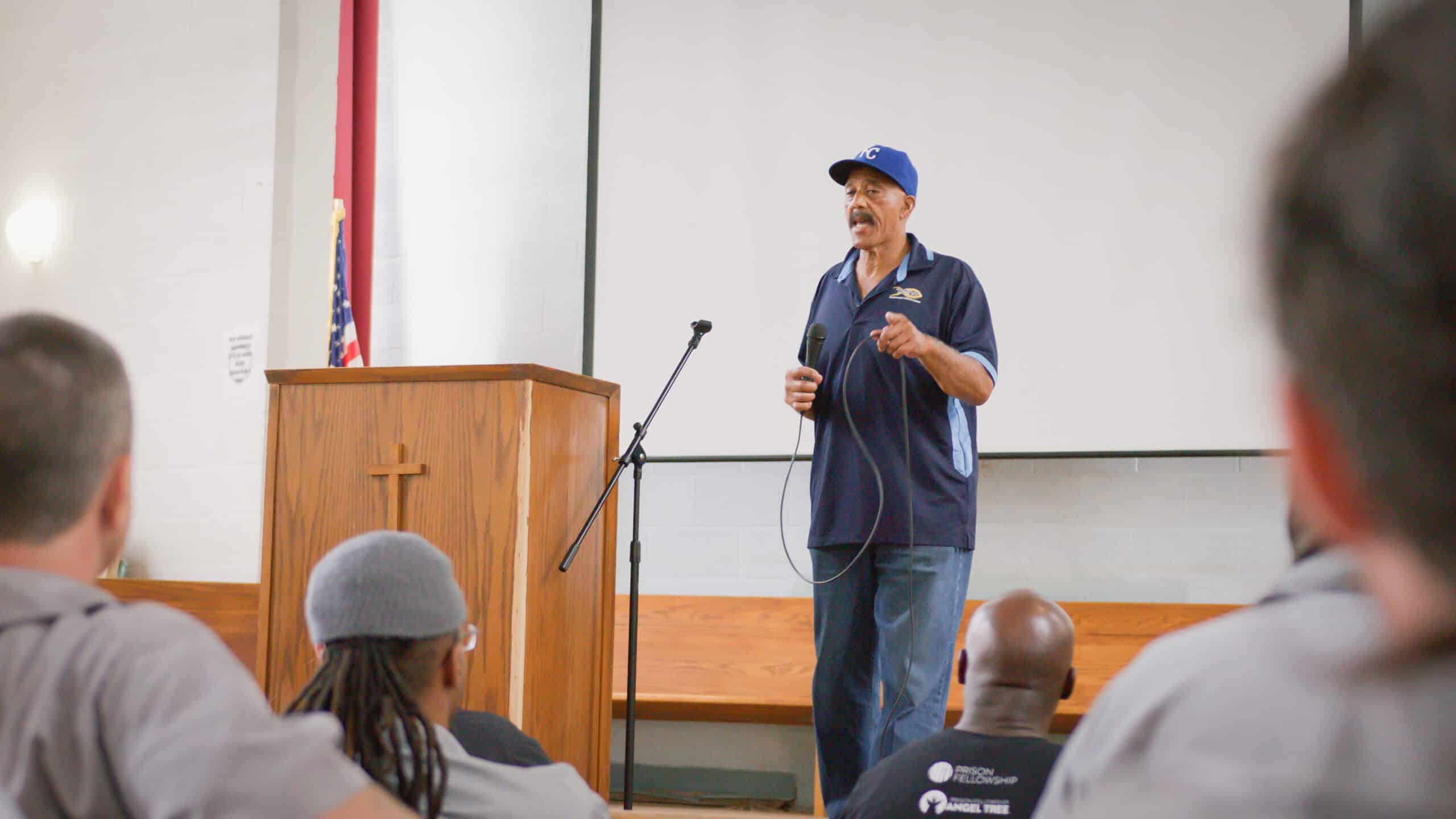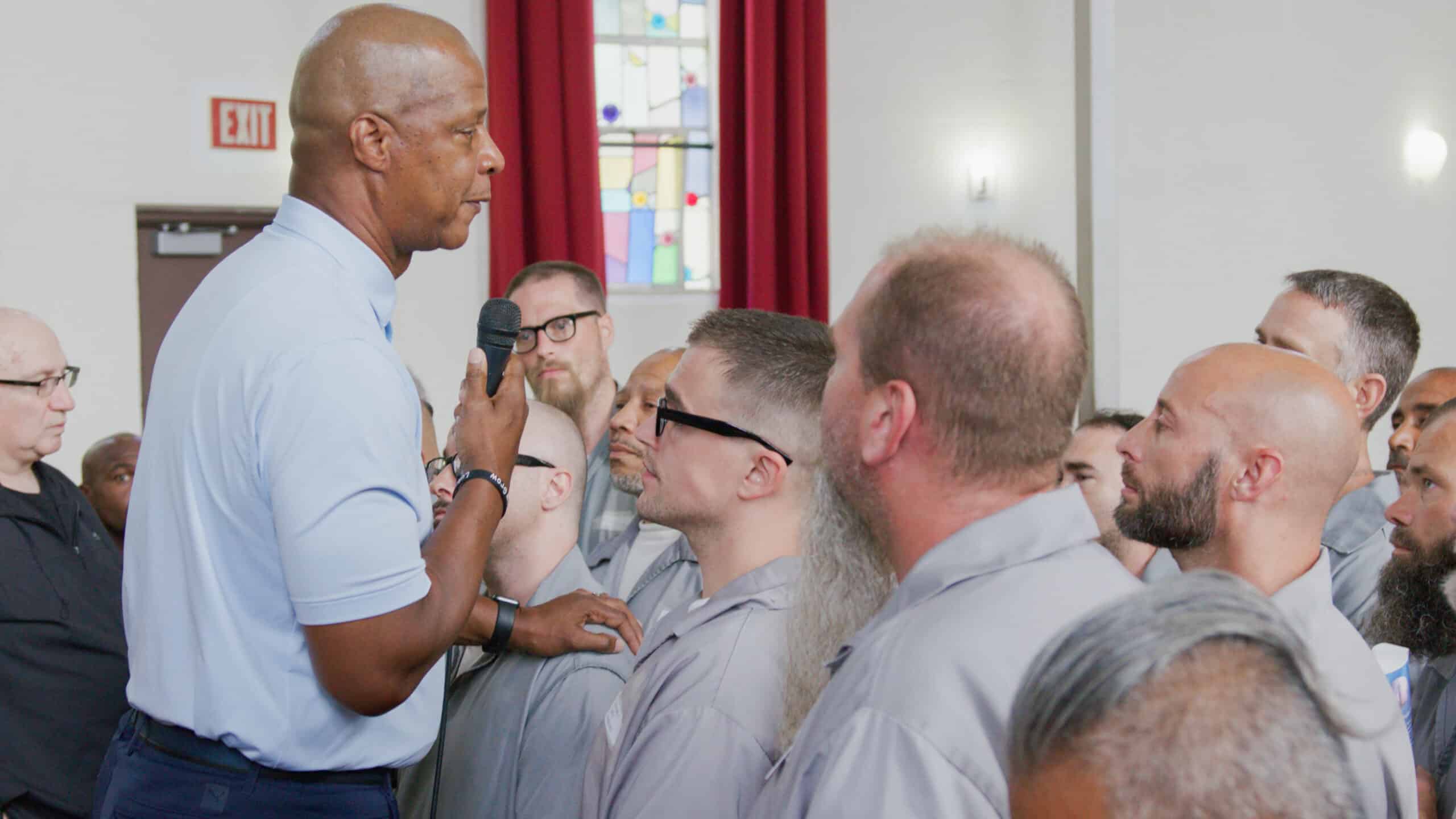The pitcher winds up, tilts his head, and throws the ball. Collectively, 20,000 strangers hold their breath. A moment later there is a swoosh as the batter swings—it’s a miss. The umpire screams out, “Strike three—you’re out!” The crowd’s released breath turns into a mixture of cheers and boos. This is baseball—America’s pastime, a game that’s been bringing people together ever since the first official major league game in 1871.
And this year, baseball gathered an unlikely group of men with one common goal: to find hope behind bars.
THE LINE UP
In July, Prison Fellowship® hosted Hope Events in Missouri with special guests Darryl Strawberry and Willie Mays Aikens, two former Major League Baseball players, who shared their testimonies and the Gospel. Over the course of two days, more than 250 men from both Boonville Correctional Center and Tipton Correctional Center attended to hear what the former ball players had to say.
The first Hope Event® was hosted in 1991, and since then these one- to two-day events have been spreading hope of the Good News of Jesus Christ to prison yards across the nation. Often, the events feature a musical guest or speaker and can provide what many call a “one-day vacation” from feeling like a prisoner.
In addition to being former Major League Baseball players, Darryl Strawberry and Willie Mays Aikens have something else in common: They were both incarcerated. This shared history allowed both Strawberry and Aikens to speak to the incarcerated men in a unique way.
Even though both men served time behind bars, they didn’t dread returning to prison.
“We are in a correction facility here in Missouri doing prison ministry,” said Strawberry, “and it's a wonderful place. It's always a wonderful place when you get a chance to go into a facility to encourage men.”
The Hope Events were led by Jermaine Wilson, Prison Fellowship’s mission ambassador.
“Today was a very exciting moment,” he said. “There was a lot of joy … and I truly believe there was a lot of purpose being discovered today.”
A LOSING GAME
After an opening prayer by Prison Fellowship staff member Bill Johnson, the former baseball stars came up to share their stories. Both men opened up about their histories with addiction and how it eventually led to their arrests.
For Aikens, his arrest would mean the end of his career in the major league and impacted his ability to play baseball outside of the United States. After his release from prison, he quickly returned to his drug of choice, cocaine, and was once again incarcerated—this time for 10 years. During that time, he committed to his life to Christ as an attempt to “trick God” into letting him off the hook.
Instead, he developed a real spiritual life behind bars, one that continued well after his release.
Aikens also shared about his experience as a father behind bars. At the time of his incarceration, he had two young daughters. He noted how important it was to stay involved in his daughters’ lives while in prison.
“I became a better father in prison than I was on the streets,” he said.
In closing, Aikens encouraged the men to be bold in their faith in God and to trust in His plan.
“You got to believe in yourself, and you got to become bold and believe,” he said. “Allow [the Holy Spirit] to help you get through the situation. … Wake up each and every day and do the right thing.”

"I became a better father in prison than I was on the streets."
—Willie Mays Aikens
A SECOND CHANCE AFTER STRIKING OUT
Following Aikens, Darryl Strawberry took the stage. Like many who are incarcerated, Strawberry has a history of being abused. He left home at 14 years old after an incident with his alcoholic father. By the time he joined the major league, he was already “broken.”
“Playing major league baseball didn’t make me well; it just made me a baseball player,” he said. “Putting on a uniform just covered up the wounds and scars of who I was.”
Throughout his career, Strawberry acquired wealth and fame—but something was missing. Externally, he was known by many as a World Series championship player. But internally, he didn’t know what his identity was—and he was searching for it in his addictions.
“I used to be a Major League Baseball player,” he said. “I hit home runs. I was in all-star games. I won championships, but who am I?”
Strawberry eventually found his identity in Christ, though only after his incarcerations for drug-related and other charges. It was through his faith that Strawberry learned to stop blaming others for the hard things in his life, and he was able to take responsibility for his actions that resulted in his incarceration. He encouraged the men at Boonville Correctional Center and Tipton Correctional Center to do the same, knowing that God can use them despite their mistakes.
“He's not looking for someone that's perfect,” Strawberry said. “He's looking for people that are available.”

THE GRAND SLAM
Following both men’s testimonies, Strawberry led the prisoners in an altar call. The impact on the lives and hearts of the men in both facilities was evident. Tears flowed down many faces as men walked to the front of the room to indicate they wanted to give their lives to Christ. Often in prison, men are on guard with one another. But after hearing from Strawberry and Aikens, those in the front of the room stood with their arms around one another, a new bond forming that day.
“I felt the move of God,” said Jermaine, “seeing men cry, knowing that those tears of pain are now becoming tears of praise were very fulfilling for me. It was exciting, and it gave me hope knowing that God has touched these men’s lives and given them hope on this day.”
More than 30 men committed their lives to Christ at the Hope Events. Prisoners from many different faith backgrounds expressed interest in learning more.
“[Today] answered a prayer for me,” said Yeprem, an incarcerated attendee at Booneville, “because I’ve been asking God to give me strength and encouragement. … I got strength and courage out of that, just like I asked for in my prayers.”
Throughout the day, Prison Fellowship staff posed the question “What does hope mean to you?”
When asked that question after the event, one attendee responded, “Hope, to me, is encouraging that anything is possible. Don’t never, ever think that your situation is too hard, or that you’re not worthy, or that your self-worth is nowhere, or you can’t do nothing with yourself. Don’t never think of yourself as nothing, because God will take something bad and make it good all the time.”
"[God's] not looking for someone that's perfect. He's looking for people that are available."
—Darryl Strawberry